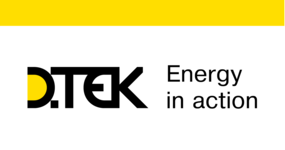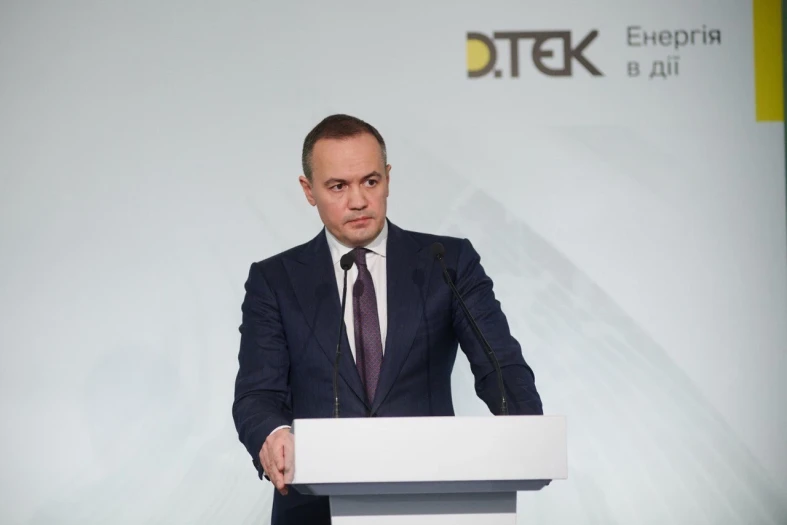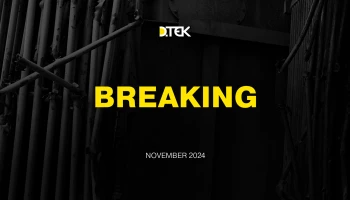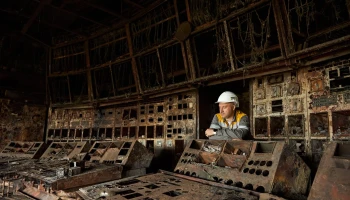Are you in London on business?
Not only. It is important that the West keeps Ukraine in the focus of attention. We communicate with Western companies and government officials. We inform about what is happening, we help with the delivery of humanitarian aid. On June 29th, a report on Ukraine's role in Europe's energy security has been presented in the British Parliament. We took part in putting this analytical report together. This document demonstrates how much Europe depends on russia in terms of energy resources, and how Ukraine can be part of the solution to this problem. We have a huge potential for the development of green generation and hydrogen, atomic energy, and gas production. Ukraine should become an exporter of energy resources to the EU. This is one of the foundations of the country’s post-war reconstruction. We already export electricity. I am sure that Ukraine will start exporting gas in two years, given the significant drop in consumption. However, for this to happen favorable market conditions to ensure investments should be created.
Post-war restoration of the energy industry will require impressive amount of funds. Where should they come from?
First of all, I hope that donor money will continue coming into the UNITED 24 fund. The possibility to attract private capital should also be taken into consideration. Destining Ukraine with the right role in this process means attracting private capital.
What is required of Ukraine? Creating the most favorable conditions for private business, simplifying all permitting procedures, creating a transparent regulatory field, and increasing cross-border capacities for energy export to the EU.
Ukraine should become an exporter of energy resources to the EU. This is one of the foundations of the country’s post-war reconstruction.
These projects in Ukraine would require neither budgetary support nor green tariff. Investors will build green generation in Ukraine for export to the EU.
On the other hand, a private investor will need political guarantees in case russia decides to attack Ukraine again in a few years. Private investments in Ukraine must be protected by guarantees. These guarantees can be provided by European and American credit agencies and institutions.
What do Western companies and international financial organizations say? Are they ready to get involved?
My conversations with MFIs, equipment manufacturers, and generating companies are optimistic. They claim to be ready. Large-scale programs like this require leadership. First of all, from the state government.
We must have a plan, a big idea, where we see our energy. It is essential to make it clean, technology-based, Europe-oriented. We have to develop our energy strategy taking the needs of the EU into account. In my opinion, attracting private investment is the most favorable idea. The consumer will not pay for it, there will be no need to raise tariffs, and there will be no need to take funds from the state budget.
DTEK will be among the first ones to participate in these projects. We are very interested in this.
How wide is the damage suffered by the company due to the war?
We have organized a working group, created a special platform and database, where we record every destroyed, damaged, or captured object down to the inventory number. We will have more than enough evidence base for future trials. The total amount of damages is still in the process of calculation. It is a constant process, and until the end of the war it is difficult to draw the line. I can say with confidence the sum will grow around tens of billions of dollars.
When do you plan to file a lawsuit against russia for the compensation of these losses and in what format?
The company's shareholder, Rinat Akhmetov, has already filed a claim with the ECtHR regarding losses for all SCM companies. This is the first step. We believe that this claim should be accepted by the ECtHR and considered in an expedited manner. We continue to build the evidence base. Therefore, specific figures in this lawsuit have not yet been formulated.
Regarding further lawsuits. We actively cooperate with Ukraine’s government, working through the legal base to launch the processes. Our goal is not to sue for the sake of suing. We want to win the court, receive funds, and invest them in the restoration of enterprises and infrastructure of Ukraine. This requires a change in Ukrainian legislation as well as in Western countries where russian assets have been seized. More active legal actions will begin in the fall.
What are the losses in terms of generation and production?
Among the big losses of "DTEK Energy" is the Luhansk power plant that has been seized over the first days of the war. The Zaporiz’ka TPP is located in the occupied territory. It has stopped operating. So far, we do not fixate interference in its work. Our duty staff is there.
Kryvoriz’ka and Kurakhivs’ka stations are under threat. They are constantly fired upon, but so far, they are operating stably.
Electricity production at our thermal power plants fell by 30% due to a decrease in demand. We are trying to maintain coal production at last year's level. There are no big losses at DTEK Oil&Gas. We are doing everything possible to maintain production at last year's level - 2 billion cubic meters.
What about green generation?
All our wind farms have stopped operating and have been preserved. Our employees periodically check on these objects to prevent looting. Solar power plants are operating. Due to the fact that wind farms stopped operating, production of green energy fell by 70%.
We are currently considering the possibility of resuming the construction of one of our RES facilities. This will be a powerful signal to potential investors that DTEK believes in Ukraine, is ready to invest, and even in the hot phase of the war, we continue to implement our large-scale projects.
Grids?
The biggest damage caused to "DTEK Grids" is in the regions of active hostilities - Donetsk and Kyiv. After the liberation of Kyiv region, we completely restored electricity supply in 45 days, spending more than UAH 300 million.
However, all that work is just a temporary solution to literally keep the light on. Restoring the grids to at least the pre-war level will take much more time and billions of hryvnias of investment.
Destruction continues in the Donetsk region due to active hostilities. We restore powerlines every day, and the russians destroy them over and over. It is difficult to calculate the damage until the hostilities stop. Since the start of the war, we restored electricity supply to almost 3 million Ukrainian households.
How much did the company's income fall?
Revenues from the sale of electricity from thermal power plants fell by 20%. We receive 15% of the “green tariff” for green generation. In addition, we have huge debts from Ukrenergo for the “green tariff” and the balancing market, that amount to billions of hryvnias.
We are experiencing liquidity problems. For six months, the company has been surviving on the stocks it had before. Both financial and material. To move forward and invest, this problem should be solved with the participation of the state.
Is there a threat of default?
Creditors understand the situation. If we have the opportunity, we pay strictly on time. If this is not possible, we negotiate with creditors, avoiding defaults.
Today, the situation with creditors is stable. We do not expect default. I hope that my optimism today will not change in a few months - the situation is constantly changing.
You are now storing your gas in storage instead of selling it. Why?
The problem of selling our gas is related to a sharp drop in consumption by industrial consumers in the Donetsk and Dnipropetrovsk regions.
Why not sell it to Naftogaz, which needs it to get through the winter?
There should be a will not only of a seller but also of a buyer. The buyer does not yet have the opportunity or will to buy our volumes.
I was informed that Ukraine was starting to import large volumes of gas. I do not understand the logic when the state starts importing instead of prioritizing the purchase of gas already produced by Ukrainian companies for hryvnias.
30% of the money spent on the purchase of domestic gas will be returned to the budget in the form of rent, and another 10% will be returned in the form of other taxes. The country needs this gas, and domestic producers need funds for investment.
We offer to buy it at market prices, which will still be lower than the prices of imported gas.
Are you ready to invest in mining amid war?
We are ready to drill, invest, but we need signals. Drilling a well takes 6-12 months. We have to understand that Naftogaz will buy our gas at least over the next six months. We have shown the government where we will spend this money. We are still waiting for the decision.
There must be government decisions that will allow us move from survival mode to investment mode. We all survived the shock of the first months of the war, but today we have to give impetus to Ukrainian companies to make investments, develop, pay taxes and salaries.
We need to restore the economy, otherwise there will be no victory. Everyone understands the tactics of the invaders: it did not work in a military way - they want to strangle us economically.
Can power exports improve the liquidity situation?
On June 30, the export of 100 MW began. This is a drop in the ocean. The position taken by the Europeans is, to put it mildly, strange. "Ukrenergo" has done a lot to synchronize and start exporting, but not at such a pace.
During the entire time of synchronous operation, we did not have any serious anomalies. It seems to me that Europeans should be more active. I held many meetings with our partners in Washington, Vienna, London regarding this topic.
Our consumption has fallen, there is a capacity surplus, and Europe needs electricity. In Ukraine, electricity costs €75 per MWh, and in Hungary it costs more than €200 per MWh. Give us the opportunity to earn support our power system.
On top of that this difference goes to the state. For example: at the first auction for exports to Romania, 86% of the price spread was channeled at paying for the crossing, that is the money went to the state company Ukrenergo. Such a high crossing fee is the result of competition. What we have been saying for a longtime: don't try to remove any excess profits by applying regulatory restrictions but make the environment as competitive as possible - and the state-owned company will receive the needed profit.
Why is Europe delaying this process?
The Europeans delayed the start of commercial exports for three months, fearing technical risks. Indeed, the key limitation today is technical. We have been given 100 MW so far. If everything goes well, this amount will increase monthly. Although before the war, we exported 650 MW from Burshtynsky Island. Today, we believe that a minimum of 800 MW can be exported without installing additional equipment and without risks to the stability of the system.
We are actively discussing the idea of building a 20 MW industrial energy storage system that can provide additional system stability. If Ukrenergo confirms that the installation of such a system, for example, at Burshtynskaya TPP will help expand the crossing, then we will be able to complete this project in the first quarter of 2023.
In general, the operating lines allow for the export of 1,600 MW. On top of that the restoration of the Khmelnytskyi NPP - Rzeszów line, which will add another 1,000 MW is currently under discussion. I hope that "Ukrenergo" together with the Polish system operator (PSE) will be able to restore the operation of this line by the end of this year.
How much does DTEK plan to earn from exports, and whose electricity will it supply?
The DTEK group is currently represented at auctions for the purchase of the crossing by the DTEK Zahidenergo company, which supplies electricity of its own production. In 2022, the profitability of TPP is at the level of minus 20%, so we are not talking about any profits so far.
Further, we also plan to export a mix of electricity from nuclear power plants, thermal power plants, and renewable generation, which D.Trading will purchase at stock auctions.
Can Ukraine get by with its own coal over this winter heating season? Does DTEK plan to import coal?
If there are no destructions, if we work at the current level, then DTEK will not import coal. We will fully provide for ourselves and will also help Centernergo.
From what I can see now, about 2.5 million tons should be put into storage by the start of the winter season. Today, there are 1.6 million tons in warehouses. If our mines remain in stable operation, coal imports will be needed in small amounts if needed at all.
How much gas does Ukraine need to import to get through the heating season?
We will need at least 3 billion cubic meters. The government wants to import about 5 billion cubic meters to bring the reserves to 19 billion cubic meters total.
On the one hand, if we lose coal mines in the east of the country, then power plants will have to be converted to gas burning. For this, an additional 2-2.5 billion cubic meters of gas will be needed.
On the other hand, it's a lot of money. Therefore, I still do not have a clear answer.
What is the situation with "Kirovohradoblenergo"? Are you still planning to buy this asset?
Antimonopoly Committee of Ukraine has not yet issued a permit for the acquisition. We hope for a positive decision. We provided all the necessary documents and guarantees to ensure competitive and transparent operating conditions.
Unfortunately, we have been waiting for approval for a year. Once the decision is made, then we decide on the issue of acquisition. Now we own only 24.5% of Kirovogradoblenergo.
Can the delay have anything to do with the owner of Kirovogradoblenergo?
I don't know, it's better to ask AMCU.
Are you planning to buy other VS Energy oblenergo?
We are interested in this segment of the market and not only VS Energy oblenergo. But today it is definitely not a priority.
Before the war, you planned to build a wind farm in Romania. Did you have to put these plans on hold?
No. Plans are relevant. Perhaps at the end of the year we will start a pilot project in Romania. We still have to calculate through the financial possibilities, but, as a rule, European projects can be financed up to 70% with debt capital, so we can minimize equity capital.
The strategic importance of renewable energy for the company remains and even increases. Europe is refusing russian energy resources, which means that it is necessary to invest in "green" generation. This solves two issues: combating climate change and reducing dependence on russia. We will continue to invest in this area.
Demand for coal has increased in Europe, coal stations are being deconserved. Has DTEK reconsidered its plans to close mines and reduce the share of coal-fired generation?
Today, energy security is of utmost importance for Ukraine. We will mine coal and produce thermal electricity as much as the state needs from the point of view of energy security. This is currently a priority task.
But, at the same time, we want to do our best to build capacities that will replace coal generation. Strategically, we are not putting our plans to become a carbon-neutral company by 2040 on hold. Of course, because of the war, these timing has changed.
You plan to invest in "Lvivvugilya". Will it be a mine purchase, concession, or lease?
We are still discussing this with the Ministry of Energy. No final decision has been made yet. The ministry will determine its position in the next 1-2 months. After that, we will discuss all the legal issues so that it is a fair agreement between the state and the company.
Our employees conducted the analysis of "Lvivvugilya". We understand what we, as an investor, need to do with this asset. We can increase the volume of production at these mines by 2.5 times within 2-3 years. This will require hundreds of millions of hryvnias of investment.
We preach the ideology of production concentration, that is, to extract more coal from fewer mines. At the same time, we plan to keep the employees on board.
Before the war, the company was undergoing transformation. Has the process been put on hold as well?
We went through several stages of transformation: we identified new directions for investment, and we made a bet on decarbonization. Recently, we have been moving away from being a vertically integrated company to more decentralized businesses. We had to adjust to the realities of war, but these changes are not fundamental.
Over the first weeks of russian invasion, the company operated under the so-called wartime administration with a high level of centralization and decision-making. Gradually we started to change it. Our planning horizon has significantly shortened - to 6-12 months for each of the businesses. Now our main priority is to mine as much coal as possible and produce as much electricity as the state needs. However, we still aim at building a company that would lead decarbonization in Ukraine.






